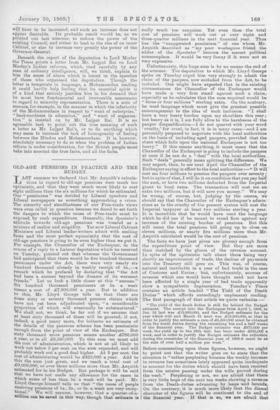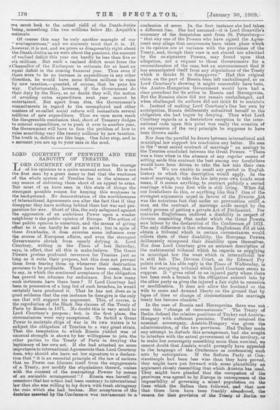OLD-AGE PENSIONS IN PRACTICE AND THE • BUDGET.
,AST summer we declared that Mr. Asquith's calcula- tions in regard to old-age pensions were much too optimistic, and that they were much more likely to cost eight millions than the six millions for which he estimated. Our " pessimism " was derided by Liberal speakers and Liberal newspapers as something approaching a crime. The sincerity and steadfastness of our Free-trade views were even called in question because we dared to set forth the dangers to which the cause of Free-trade must be eiPosed, by such expenditure. Generally, the Spectator's attitude towards old-age pensions was treated as a mixture of malice and stupidity. Yet now Liberal Cabinet Ministers and Liberal leader-writers admit with smiling faces and the most perfect equanimity that the cost of old-age pensions is going to be even higher than we put it. For example, the Chancellor of the Exchequer, in the course of a reply to a Labour deputation which he received on Tuesday, pointed out that whereas the Government had anticipated that there would be five hundred thousand pensioners under the Act, there were very nearly six hundred thousand already in weekly receipt of 5s.,—a remark which he prefaced by declaring that "the Act had been a success beyond the dreams of its warmest friends." Let us look a little closer at this "success." Six hundred thousand pensioners at 5s. a week Means a cost of £7,800,000 a year. But in addition to this, Mr. Lloyd George tells us that there are gores silty or seventy thousand pension claims which have not yet been adjudicated upon, "a considerable proportion of which will eventually be substantiated." We shall not, we think, be far out if we assume that at least sixty thousand of these will be granted, if not, indeed, a good. many more, for hitherto no estimate of the details of the pensions scheme has been pessimistic enough from the point of view of the Exchequer. But sixty thousand more pensions means another .£780,000 a year, or in all £8,580,000. To this sum we must add the cost of administration, which is not at all likely to work out below 5 per cent. on the sum expended, and will probably work out a good deal higher. At 5 per cent. the cost of administering would be .£429,000 a year. Add to this the sum just given, and we reach a total cost of £9,009,000, or over three millions more than Mr. Asquith estimated for in his Budget. But perhaps it will be said that we have not made any allowance for the cases in which sums of less than 5s. a week will be paid. Mr. Lloyd George himself tells us that "the cases of people receiving pensions of Is., 2s., or 38. a week are very excep- tional." We will assume, however, that a quarter-of-a- million can be saved in this way, though that estimate is really much too sanguine. Yet even then the total cost of pensions will work out at over eight and three-quarter millions in the next financial year. Thus has the "exaggerated pessimism" of one whom Mr. Asquith described as "my poor woebegone friend the editor of the Spectator " become the merest political commonplace. It would be very funny if it were not so very expensive.
Unfortunately, this huge sum is by no means the end of the account. The deputation to which Mr. Lloyd George • spoke on Tuesday urged him very strongly to admit the claim of the paupers, now excluded from the Act, to be included. One might have expected that in the existing circumstances the Chancellor of the Exchequer would have made a very firm stand against such a claim, especially as lie calculates that the sum required would be "three or four millions " sterling extra. Oe the contrary, he used language which must give the greatest possible encouragement to the idea of such inclusion. "I shall have a very heavy burden upon my shoulders this year.; but heavy as it is, I am fully alive to the harshness of the pauper disqualification—I do not quarrel with your word 'cruelty,' for cruel, in fact, it is in many cases—and I am personally prepared to negotiate with the local authorities on the basis of including aged paupers, provided that the share which falls upon the national Exchequer is not too heavy." If this means anything, it must mean that the Chancellor of the Exchequer is going to include the paupers at once if he can do a "deal" with the local authorities.. Such "deals" generally mean splitting the difference. We may expect, then, to see next April the Chancellor of the Exchequer saying in effect to the local authorities :—" It will cost me four millions to pension the paupers over seventy; but in spite of that, I will do it on condition that you pay half the sum, or have two millions deducted from the Imperial grant to local rates. The transaction will cost me an extra two millions, but it will save you money." We may be wrong, of course, but, judging by the omens, we should say that the Chancellor of the Exchequer's admis- sions as to the cruelty of the present system will cost the Imperial taxpayer at least two millions sterling a year. It is incredible that he would have used the language which he did use if he meant to stand firm against any increase of the existing burden of pensions. But this will mean the total pensions bill going up to close on eleven millions, or nearly five millions more than Mr. Asquith calculated would be the cost of pensions.
The facts we have just given are gloomy enough from the expenditure point of view. But they are more than matched by the gloom of the revenue account. Iii spite of the optimistic talk about there being very shortly an improvement of trade, the decline of payments into the Treasury still goes on. This was, of course, natural and inevitable in a. year of bad trade in the case of Customs and Excise ; but, unfortunately, sources of revenue which one would have thought need not have been affected by a. single year of bad trade apparently show a sympathetic degeneration. Tuesday's Times contains an article headed "The Yield of the Death Duties" which affords exceedingly unpleasant reading. The first paragraph of that article we quote verbatim The yield of the death duties is still far behind the Budget estimate. The receipt into the Exchequer from April 1, 1908, to Jan. 16 last was £13,983,000, and the Budget estimate for the year which will and March 31 next was £19,600,000, so that in order to justify the estimate a sum of £6,500,000 must be obtained from the death duties during the remaining ten and a half weeks of the financial year. The Budget estimate was 4376,000 per week, the yield up to the 16th inst. has been under .6335,000 week, and in order to justify the Budget estimate the collection during the remainder of the financial year of 1908-9 must be at the rate of over half a million per week."
Before commenting upon these figures, however, we ought to point out that the writer goes on to state that the situation is "rather perplexing because the weekly increase in revenue has sometimes lately appeared quite inadequate to account for the duties which should have been received from the estates passing under the wills proved during the week." Perplexing or not, we are afraid that there is very little hope of the next ten weeks showing a revenue from the Death-duties advancing by leaps and hounds. On the contrary, it is much more likely that the dismal character of the figures will be continued to the end of the financial year. If that is so, we are afraid that we must look to the attual yield of the Death-duties .being„ something like two milliens below Mr. Asquith's estimate.
Of course this may be only another example of our "woebegoneness," and we sincerely trust that it is. If, liowever, it i8 not, and we prove as disagreeably right about the Death-duties as we were about the pensions, the amount of realised deficit this year can hardly be less than five or ,sia millions. But such a realised deficit must force the *Chancellor of the Exchequer to estimate for at least an equal deficit in the coming financial year. Thus even if there were to be no increase in expenditure in any other ?direction, he would have some fifteen millions to raise by new taxation,—granted, of course, that he pays his way. Unfortunately, however, if the Government do 'their duty by the Navy, as no doubt they will, the notion of avoiding extra expenditure next year cannot be entertained. But apart from this, the Government's commitments in regard to the unemployed and other matters of so-called social reform will necessitate several millions of new expenditure. Thus we once more reach the disagreeable conclusion that, short of Treasury dodges to conceal expenditure, or to push it over to another year, the Government will have to face the problem of how to raise something very like twenty millions by new taxation. The truth is, deficits are like bogs. One false step, and in a moment you are up to your ears in the mud.

























































 Previous page
Previous page